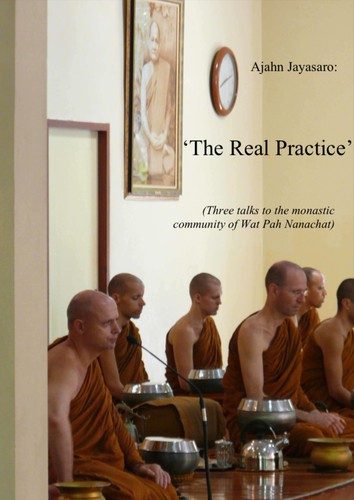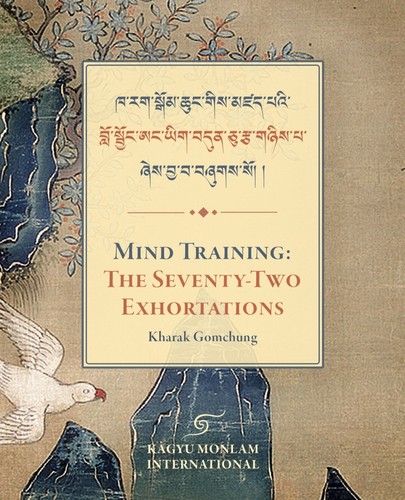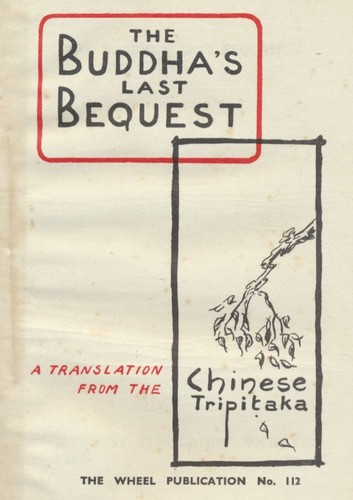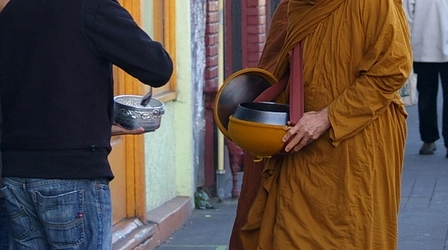Teachings for Monastics
Subscribe to this topic via: RSS
Instructions and advice for renunciants on how to get the most out of their precious opportunity for freedom.
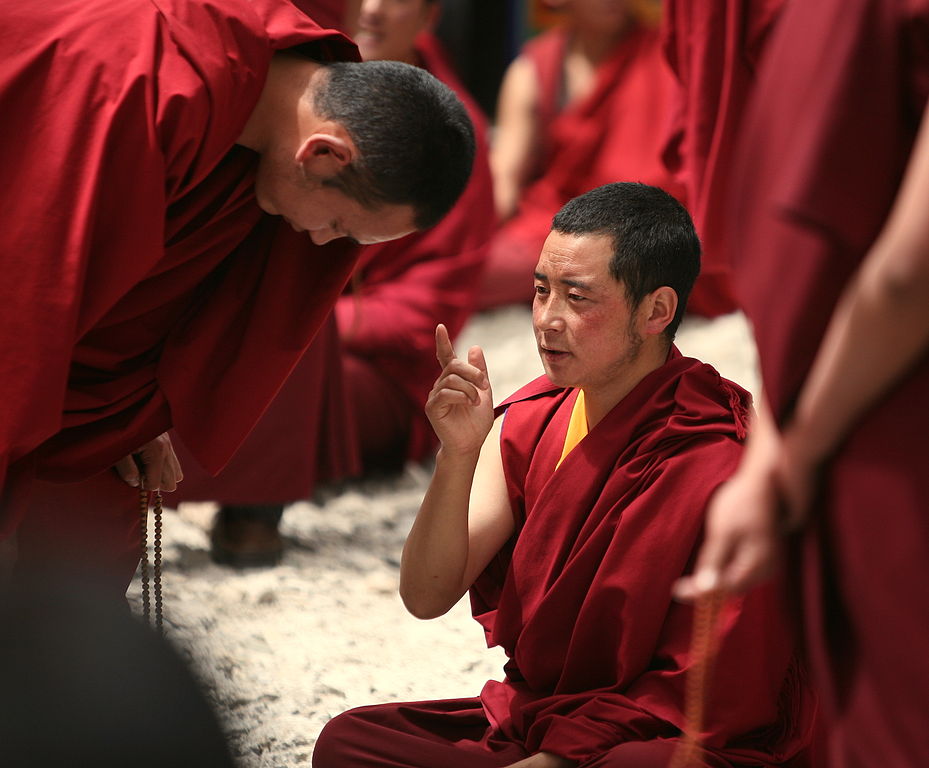
Two Tibetan monks engage in a traditional debate in the crowded courtyard of Sera Monastery near Lhasa in 2007. (Thomas Fanghaenel, BY-SA 3.0)
Table of Contents
Books (8)
Featured:
-
Of course, one who dies while sitting in zazen will never be unhappy. But it is nearly impossible to die in this manner if your body is suffering the pain of sickness. My own master (Gudō Kokushi) said, ‘Your zazen for one sitting is a lifetime of zazen.’ How edifying these words of his are.
See also:
Canonical Works (102)
Featured:
-
🥇 Best of
The canonical explication of the monastic rules.
-
⭐ Recommended
The monastic rules for Theravāda Bhikkhunis, prepared in a bilingual English-Pali edition for study and recitation.
-
Then, not receiving his parents’ permission to go forth, the clansman Raṭṭhapāla lay down there on the bare floor, saying: “Right here I shall either die or receive the going forth.”
-
⭐ Recommended
Knowledge of Silence I’ll convey,
hard to do, to master difficult,
so be both firm and resolute
and I’ll speak upon this thing. -
In the same way, a mendicant with eleven qualities can meditate observing impermanence in the eye … meditate observing letting go.
-
Being censured in this way by the Teacher, by wise companions in the holy life, by gods, and by himself, he realises no superhuman state, no distinction in knowledge and vision worthy of the noble ones. Why is that? That is how it is with one who does not fulfil the training in the Teacher’s Dispensation.
-
Now he lay among the Sal trees, about to enter Nirvana. The time was the middle of the night, calm and noiseless. For the sake of all the disciples, he briefly spoke of the most important doctrines…
-
⭐ Recommended
Let them enjoy the filthy, lazy pleasure of possessions, honor, and popularity.
-
Mendicants, a cowherd with eleven factors can’t maintain and expand a herd of cattle. What eleven?
-
The Buddha refuses to perform miracles for a layman, explaining that this is not the right way to inspire faith. He goes on to tell the story of a monk’s misguided quest for spiritual answers, an answer the Buddha ultimately gives in one of the most profound poems of the Canon.
-
The Buddha said to them: “Mendicants, what’s with that dreadful racket? You’d think it was fishermen hauling in a catch!”
-
I cannot make that person emerge from the unwholesome and establish him in the wholesome.’ one should not underrate equanimity towards such a person.
-
… he cuts its inner bark and takes it away, thinking it is heartwood; and so whatever it was he had to make with heartwood, his purpose will not be served.
-
… this is the nature of a person accomplished in view. Though they might manage a diverse spectrum of duties for their spiritual companions, they still feel a keen regard for the training in higher ethics, higher mind, and higher wisdom.
-
… five people similar to warriors are found among the monks
-
… let them fulfill their precepts, be committed to inner serenity of the heart, not neglect absorption, be endowed with discernment, and frequent empty huts.
-
The Buddha promises his half-brother Nanda five hundred celestial nymphs if he stays in the holy life. The gambit works, demonstrating the transformative potential of the monastic life.
-
The Buddha explains that diverse methods should be used for overcoming diverse kinds of problems. One who is skilled in this is “worthy of offerings.”
-
Bhikkhus, this is the lowest form of livelihood, that is, gathering alms. In the world this is a term of abuse: ‘You alms-gatherer; you roam about with a begging bowl in your hand!’ And yet, bhikkhus, clansmen intent on the good take up that way of life for a valid reason.
-
Bhikkhus, live under a protector, not without a protector. One without a protector lives in suffering. There are these ten qualities that serve as a protector.
-
A mendicant might wish: ‘May I be liked and approved by my spiritual companions, respected and admired.’ So let them fulfill their precepts, be committed to inner serenity of the heart, not neglect absorption, be endowed with discernment, and frequent empty huts.
-
… a mendicant with four qualities is worthy of offerings
-
… a gentleman who goes forth from the lay life to homelessness in this teaching and training should anticipate four dangers
-
Any bhikkhu who is skillful in this, diligent, clearly comprehending and ever mindful, is said to be standing in an ancient, primal noble lineage.
-
… these five things lead to the decline and disappearance of the true teaching
-
He walked back & forth on top of a giant mountain of excrement …
-
Whether or not other bhikkhus train, I will train.
-
Devadatta,
–regarded as wise, composed,
incandescent with honor–
in the thrall of heedlessness
assaulted the Tathāgata… -
Kassapa approaches families like the moon, with humility, keeping his distance, and not getting involved. And when he teaches, it is with pure intentions.
-
When there are no bhikkhus who are exhorters: this is a case of decline.
-
A mendicant informs Sāriputta that one of his friends had disrobed. Sāriputta attributes this to a lack of sense restraint, eating too much, and not being wakeful. He then explains the meaning of sense restraint, moderation in eating, and the devotion to wakefulness.
-
If, bhikkhus, that log does not veer towards the near shore, does not veer towards the far shore, does not sink in mid-stream, does not get cast up on high ground, does not get caught by human beings, does not get caught by nonhuman beings, does not get caught in a whirlpool, and does not become inwardly rotten, it will slant, slope, and incline towards the ocean.
-
A monk disjoined from the fetter of delight is said to be a person who is living alone.
-
⭐ Recommended
‘I must now behave in a different manner.’ This must be reflected upon again and again by one who has gone forth.
-
⭐ Recommended
Eight things for the decline or success of a mendicant in the training.
-
Ten qualities a mendicant should have to give ordination.
-
Mendicants, any mendicant who abuses and insults their spiritual companions, speaking ill of the noble ones, will, without a doubt, fall into one or other of these eleven disasters.
-
Mendicants, a mendicant with five qualities who visits families is unlikable and unlovable, not respected or admired.
-
A nun with five qualities is cast down to hell…
-
Six qualities leading to happiness.
-
A mendicant with seven qualities is liked and approved by their spiritual companions
-
The qualities of a good monk.
-
Blissful is concord in the Saṅgha.
-
A monk overhears the Buddha talking to himself…
-
Warriors who sleep on wooden pillows remain vigilant, and so it is for a spiritual seeker.
-
When the Venerable Nanda wore pretty robes, a fancy bowl, and makeup, the Buddha lamented.
-
Like they’re struck by a sword…
-
A lay family that previously had faith in a monk, supplying him with alms, falsely accuses him of trying to seduce their daughter. The monk utters these verses in reply…
-
A newly ordained monk who entered the Buddha’s path out of faith, abandoning the home life, should live in the midst of monks. He should learn the code of conduct well.
See also:
Readings (16)
Featured:
-
When feelings of discouragement come up and we are tired and disheartened we might want to give up our efforts, but once we have given up, there is no chance any more to reap the benefits of the practice. So at least keep trying, everyone. Whether we have already attained peaceful states or not doesn’t matter. Just keep on meditating, sitting or walking. Peaceful or not.
-
Here I have set down for those who wish to follow the bodhisattva path,
Thirty-seven practices to be adopted by all the buddhas’ heirs -
Six changes in the modern world that monasticism will have to adapt to, and that present new opportunities.
See also:
Audio/Video (6)
Featured:
-
Until one has a taste of samādhi, one doesn’t know the value of the Dhamma and the teaching. Until a bhikkhu experiences samādhi, he fails to see the value of the Buddha’s teaching. He may read about it in books, but paper and ink are not very tasty food!
-

-
The “Five Kinds of Monks” and what it takes for the sāsana to thrive.
See also:

